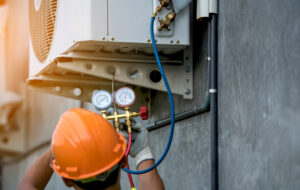 When the UK government announced, in March 2021, that £1 billion of already-allocated funds would be redirected to projects designed to reduce greenhouse gases, the energy sector sat up and listened. And with good reason – as it turned out, £171 million will be allocated to an industrial decarbonisation plan that focuses on hydrogen gas generation and carbon capture and storage technologies.
When the UK government announced, in March 2021, that £1 billion of already-allocated funds would be redirected to projects designed to reduce greenhouse gases, the energy sector sat up and listened. And with good reason – as it turned out, £171 million will be allocated to an industrial decarbonisation plan that focuses on hydrogen gas generation and carbon capture and storage technologies.
However, the news extended beyond green energy production and is relevant to domestic and industrial HVAC applications. In a gesture that reflects the role HVAC engineers and manufacturers can play in sustainability, more than £900 million will be spent upgrading public buildings, like schools and hospitals, with greener fittings such as heat pumps, solar panels and insulation, which will reduce carbon dioxide (CO2) emissions.
But where does this leave the individual households and business units that many HVAC staff visit daily? That is a question that several commentators have asked, and it seems that – for now at least – the main drive to reduce the environmental impact of privately-owned heating and plumbing systems will continue to come from the manufacturers, engineers and installers working in the HVAC sector.
And that’s quite a responsibility. According to the Office for National Statistics, in 2020, there were approximately 27.8 million households in the UK; government statistics from 2019 indicate that around 15% of greenhouse gas emissions in the UK (specifically of carbon dioxide, along with methane, F gases and nitrous oxide) came from those residential settings. That’s a lot of excess CO2 to clean up.
So, what can HVAC people do to help decarbonisation?
If they have decent equipment, heating engineers and plumbers can help to reduce that figure by 15%. For example, they are well placed to measure CO2 and other greenhouse gases: while most flue gas analysers will measure CO2, some can also measure NO/NOx (for example, the Sprint Pro 5 and Sprint Pro 6) well.
A flue gas analyser that gives a wide range of easy-to-read and interprets measurements allows engineers to see when appliances are not working correctly and whether an upgrade (for example, to a government-subsidised heat pump) might be in order.
This is a pressing need: many households hang onto appliances for as long as possible, even though older appliances tend to be much less environmentally friendly than their modern counterparts. This is bad enough for the environment, but using a malfunctioning older appliance is the worst of all possible outcomes.
A good flue gas analyser will provide the readings required to convince many customers to decarbonise their homes or businesses more effectively. It will also allow the engineer to fix many problems in more modern and efficient appliances, bringing them back to their original operating standards and protecting the planet once more.
Helping to reach net zero
In late 2021, the UK government set out its plan to reach net-zero emissions by 2050 and every heating engineer in the country has a part to play in that project. While checking flue gases may be an everyday event for many HVAC engineers, the fact remains that household and business emissions account for a substantial proportion of CO2 output and emissions of other dangerous gases. While persuading a single household to operate with lower carbon emissions may not seem like a big deal, the impact can be very substantial when this is scaled up across the country.
